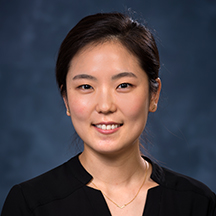Residency: Ophthalmology
The program prepares residents for the successful completion of all steps of the certification process leading to diplomate status in the American College of Veterinary Ophthalmologists after 4 years. The program trains veterinary ophthalmologists interested in pursuit of academic achievement and contribution, whether in an academic or private institution.
NOTE: This residency does NOT participate in the residency matching program VIRMP.
Program
This program exposes the resident to the fundamentals of academic veterinary ophthalmology, including a balance of teaching, service, and clinical and basic research.Clinical Responsibilities
Expectations of the Resident in Ophthalmology
- To provide 24 hour care and responsibility for their case
- To perform a physical and ophthalmic examination and review the medical record and laboratory data prior to 8 am each morning for every patient in their care.
- To be present for all house officer morning rounds, prepared and on time.
- To keep the medical record, electronic communication log, and discharge comments up to date and ready at the time of discharge for all hospitalized patients.
- To respond promptly to all referring veterinarian requests for consultations.
- To fulfill all the requirements required for the residency by the ophthalmology program at NCSU as well as the American College of Veterinary Ophthalmologists.
- Professional conduct is strongly emphasized. House officers should treat each other, staff, students, clients, referring veterinarians and senior clinicians with equal respect.
- As the program progresses, the ophthalmology faculty will provide latitude and independence in case management as experience is achieved.
- House officers are expected to engage in scholarly activity as dictated by their residency requirements and expected future careers. A plan for this must be generated within the first 6 months of residency and reviewed by the house officer and their advising committee.
Clinical Training
Case Load: The NCSU ophthalmology service examines:
- Approximately 60 patients weekly
- Performs surgery on from 10-15
- Approximately 100 cataracts are extracted annually
- The large animal case load is primarily horses and consists of approximately 30 animals per month
- The exotic animal caseload is approximately 3 animals per month.
NCSU has an approved laboratory animal facility and access to a variety of species, which the resident can examine to supplement training in this laboratory animal ophthalmology.
Clinic Schedule
- The senior clinicians / mentors will make the clinical schedule for faculty and residents
- Minor changes can be made to this schedule by discussion with the senior clinician or the residents can trade clinical duty with senior clinician approval.
- The resident’s clinical training will be directly supervised by one of the mentors at all times during the program, except for 1 to 2 months during the third year, during which time the resident may function as chief clinician and run the service. One of the mentors will be available during this time for assistance and consultation.
- Routine cases on the ophthalmology service are scheduled Mondays, Tuesdays, and Thursdays. Routine surgical cases are operated on Wednesdays (most cataract surgery) and Fridays.
Emergency Duty Rotation Schedule
- Specific emergency duty schedules will depend on the availability of other ophthalmology residents.
- Emergency duty includes weekday and weekend duty and all holidays.
- Arrangements to the contrary must be made with the faculty member on the service at the time of the holiday; however, priority will be given to the faculty, and residents should not expect to leave town during these times.
- No primary, non-ophthalmology emergency duty will be required.
- The resident will not be expected to cover emergency duty during scheduled off clinic time for manuscript and grant preparation, and board exam study, but may be responsible for these duties during the research-training off-time.
Additional Residency Requirements
- Required writing and scholarly pursuit during off clinic time
- Case Report (2 weeks)
- Retrospective study (1 month – early in 2nd year)
- Original research project/prospective (2-6 months)
- See Research Training below
- Board preparation (2-4 months)
- Board exam study (1 month – June of final year)
- Preparation 3 manuscripts and submission of 2 manuscripts to a refereed journal is a residency requirement. This includes at minimum, a case report, retrospective study, and prospective/original research project. The resident will work with the mentors to identify an appropriate study during year 1 of the residency.
- If the study requires funding, the resident will be expected to prepare and submit a research grant to one of the following sources: Departmental Grants, American Society of Veterinary Ophthalmology Grants, NCSU College of Veterinary Medicine Grants, ACVO Grants, or other outside funds.
Research Training
- The resident is required to participate in a research program of 6-8 months in duration.
- This may be in one of several laboratories in the College depending on funding availability and the background of the resident.
- The background experiences and interests of the resident will dictate the nature and scope of the post doctorate program, in addition to funding.
- Research grant preparation and submission by the resident will be a component of this aspect of the program and may be directed at a variety of funding sources, including those listed above
- The NCSU ophthalmology section has a 500 square foot laboratory and a full-time research technician. In addition to a wide variety of research equipment, this laboratory houses computers with a wide variety of software programs (graphics, data analysis, word processing, image scanning, slide generation, E-mail, internet access) for the resident’s use.
Extracurricular training
- Basic science course (3 weeks)
- The resident is required to attend a Basic Science Course in Ophthalmology.
- This time is an expected 3-4 weeks of their total OFF clinic time
- The resident will be paid their customary stipend for attending the course.
- The Ophthalmology Section will make every effort to support the costs of tuition; however, remuneration for the costs of tuition for the course will depend on available funding from the College, and tuition will be the ultimate responsibility of the resident.
- The resident must provide travel and housing; however, the resident’s travel budget may be used for this purpose.
- Opportunities are also provided for the resident to participate in examination of laboratory animals and observation of human ocular surgery (Duke University).
- Residents are also encouraged to attend the Ophthalmology Seminar Series at the Duke University Eye Center.
- Visits to regional specialty practices may also be arranged during off clinic time.
- The resident is also encouraged to participate in 2-4 CERF clinics per year, held at local dog shows.
- The resident may also be assigned to 1 to 2 weeks a year at Animal Eye Care in Cary, North Carolina to learn about private practice ophthalmology
Off Clinic Duty Responsibilities
- Amount of time: The resident will be allowed 6-8 weeks off clinic duty the first year, and approximately 8 months off clinic duty for the remainder of the two years.
- First year : This time will be in the form of 2-week blocks, to be used at the resident’s discretion for literature review, designing a clinical research project, writing a grant, or preparing for the post doctorate research
- Years 2-3: the resident will spend approximately 8 months off clinic duty
- Includes approximately 4-6 months performing research
- A written plan must be given to the mentors prior to going off clinics describing work to be done during the off-clinic time
- The specific schedule will be determined during year 1 of the program and will depend on research funding for the post-doctorate and the background of the resident
- Time off clinics to attend scientific meetings may be allowed
Teaching Experience
- The resident will be expected to be an active and vital member of the teaching team in ophthalmology.
- They will have the opportunity to assist with and, in some cases, lead the discussion in several teaching laboratories for veterinary students.
- These will include assisting with junior surgery laboratories in ophthalmology, case study laboratories in the clinic, and didactic course (years 1-3) case study laboratories.
- The resident will also be expected to lead discussions, direct learning, and assess the performance of the senior veterinary students and interns during their clinical rotations.
- The resident will also be required to conduct at least one continuing education presentation for practicing veterinarians during the second year of the program and assist with a workshop in ophthalmic exam techniques for veterinary technicians.
Vacation
- Two weeks (12 working days) of vacation are provided each year and should be arranged in advance. Vacation needs to be taken during the resident’s scheduled off-clinic time.
- Vacation cannot be taken during the last month of the academic year (June) or during a period where the resident or intern is the only house officer on a particular rotation.
The supervisor of the house officer and the faculty member on the particular rotation must approve the vacation time.
ACVO Board Preparation
Special sessions are held each Monday from approximately 8:00-9:30 a.m. to facilitate preparation for the board examination. Journal review is held twice monthly, with pathology review and grand rounds (case presentation) taking place on the alternating weeks. Surgical cadaver training and slide rounds take place on Fridays from approximately 8:00-9:30 am
Journal Review: Journals are reviewed in 2 groups, each on alternating sessions. In the first group are 26 veterinary journals, and in the second group are human and basic science journals. All papers in the veterinary literature that pertain to ophthalmology are reviewed and are the responsibility of the resident to pull and review. The mentors select the pertinent articles from the human and basic science literature for review. At each session there are from 3 to 10 manuscripts discussed. The resident is expected to have critically reviewed each manuscript and to have critiqued, in writing, the scientific methods used. The responsibility for library work is shared equally between the resident and mentors.
Pathology Review: Once a month. The resident has at their disposal an ophthalmic pathology slide file containing all histologic specimens processed over the previous 12 years, each accompanied by a written report. Ophthalmic specimens processed by the histopathology laboratory during the previous month are reviewed. The resident is expected, prior to coming to the review session, to have studied the slide and written a comprehensive histopathologic description of their findings. After the clinical details of the case are presented, the residents present their findings to the group (which include pathologists and pathology residents) with the slide being jointly viewed through a multi-observer scope. Mentors and residents share equally the responsibility of identifying slides for review.
Slide / Image Exam Training: Once a month. Devoted to the practice of spontaneous clinical photograph interpretation. This exercise is designed to help the resident learn to objectively and thoroughly assess clinical photographs (gross adnexal, globe, or fundus lesions, or diagnostic procedures) and prioritized differential diagnoses.
Study Review Sessions: During the first month of the program, the resident is required, with guidance from the mentors, to schedule their reading of manuscripts and textbooks for the coming 3 years. Review sessions are then scheduled to take place on a quarterly basis. Each review session lasts approximately 60-90 minutes, during which time the mentors ask the resident questions pertaining to the assigned material. During each session, pertinent texts and manuscripts are covered. The purpose of this exercise is to ensure that the resident’s board study progresses on a timely basis. The resident has at their disposal a computer-indexed reprint file containing several thousand ophthalmology related manuscripts.
Review Schedule
Journal 1 (Once a month)
Review of ophthalmology-related articles in veterinary journals
Responsibility of Scheduled Person
- Review the previous month’s veterinary journals and retrieve all ophthalmology related articles
- Mark off which journals were reviewed in the journal club folder
- Place 1 copy of the articles in the ophthalmology cubicle at least 1 week prior to the scheduled journal club
- Send out a reminder email of the journal club at least 1 week prior to the schedule meeting date.
(Residents, graduate students, regular visitors to be assigned)
Journal 2 (Once a month)
Review of ophthalmology-related articles in veterinary journals
Responsibility of Scheduled Person
- Review the previous month’s research and human journals and retrieve all veterinary or reseach-interest related articles
- Place 1 copy of the articles in the ophthalmology cubicle least 1 week prior to the scheduled journal club
- Send out a reminder email of the journal club at least 1 week prior to the schedule meeting date.
(Residents, graduate students, regular visitors to be assigned)
Pathology (Once a month)
Review of the previous month’s histopathology slides and/or selected histopathology cases/slides with the pathology faculty
Responsibility of Scheduled Person
- Pick up saved slides from the histopathology lab
- Create work sheet with case number, signalment of animals with path slides
- Send out a reminder email to ophthalmologists and pathologists of the path rounds at least 1 week prior to the schedule meeting date.
- Review all slides (everyone)
(Residents, faculty members be assigned)
Section meeting (Once a month)
General business meeting of the ophthalmology section with the clinical technicians.
No specific assignments – all members of the ophthalmology section are to attend this meeting (Residents, faculty, clinical technicians) regardless of being on or off clinics. This meeting is to review schedules, discuss issues and problems, and to bring up new ideas.
Slide Rounds (Once a month)
Review images and questions to prepare for ACVO examination
- Faculty will send out images and questions a week prior to the practice exam
- Residents to review the slides and answer the questions prior to rounds
Review Session (0nce a quarter – Thursday morning prior to VERC)
Individual oral examination of resident on subject dictated by study schedule
Residents should have reviewed literature as described in study schedule. Faculty will ask questions (detail and difficulty as resident would expect on the ACVO examination) on the selected subject.
( Residents only )
Resident Review (Every 6 months)
Individual formal resident review
Review of resident over the past 6 months. Fill out review sheet
(Residents and Faculty)



